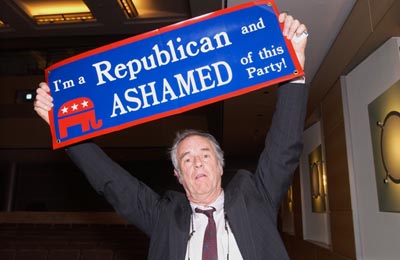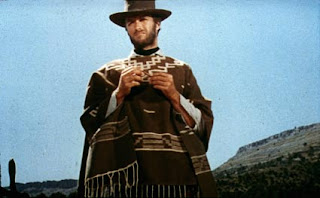Dylan Ratigan, who rants for a living every afternoon on MSNBC, has been occasionally compared to Howard Beale, the iconic TV anchorman in the prescient 1976 movie Network who urges Americans to shout out the window: “We’re as mad as hell and we’re not gonna take this anymore.” But to hear Ratigan explain his anger, he’s more in the mold of Martin Luther, a renegade priest on a holy mission to save capitalism from the corruption of its body and soul.
“I am a true believer still,” Ratigan says, despite a career that has transformed him from a financial groupie for Wall Street into a fiery crusader for reform, or possibly revolution. A man who inveighs with pop-eyed rage against the “Greedy Bastards” –the title of his new best-selling book-- of Wall Street and Washington, and who has proved to be a harbinger for the populist Occupy Wall Street movement.
Overcaffeinated, hyper-verbose, rattling off arcane jargon that even his TV guests sometimes don’t understand, Ratigan remains at heart very much what he started as: a creature of the financial world. No surprise: Ratigan came of age working the arterial heart of financial journalism, beginning at Bloomberg, where he rose from hotshot mergers & acquisitions reporter to global managing editor; then moving to CNBC, which covers Wall Street in somewhat the way Pravda once covered the Soviet Union-- with passionate devotion and without asking fundamental questions about the legitimacy of the system.
It was at CNBC, in 2008 and the beginning of 2009, that Ratigan first began doing his Howard Beale imitation. Once part of the crowd of Wall Street cheerleaders, Ratigan suddenly found himself alone and appalled. He was outraged that neither his journalist colleagues nor anyone in the regulatory world was openly acknowledging the truth: that the worst financial crash since the Depression meant that a great “experiment” in financial capitalism had failed. For more than a decade, the financial system had “distributed risk” around the world on the theory that it could be spread out to those who could best bear it, and everyone could keep track of it with super-complex formulas and really powerful computers. Securities based on subprime mortgages were only part of the experiment.
“The idea was that people who can most afford to take the risk take it, and you end up with a tremendous super cycle of credit that creates an explosion of activity. That was the theory of the experiment. I was fully on board with that,” he says. The ambitious child of a single mother from upstate New York, Ratigan began his career as a journalist learning finance at the feet of Warren Buffett, attending his famous annual meetings in Omaha. “His point always was that the point of capitalism is to invest capital and align investor interests with entrepreneurs. … Bloomberg’s purpose was to enhance the quality of that decision-making. Financial journalism seemed noble to me in that context because I felt I was participating in the parsing of that information,” he says.
For many years the “experiment” seemed to work. The economy was humming, despite the housing bubble and growing alarms about income inequality; it was the era of expansion and seeming mastery of capitalism that economists called “the Great Moderation.” “It was awesome. I enjoyed it. I bought a Porsche,” says Ratigan, who still lives in Tribeca half a block from Citigroup headquarters, or what he calls “South Hedge-istan.” “My personal life was totally validating my professional narrative.”
But as it turned out, no one really knew what the risks were and where they were going, and the huge Wall Street institutions that everyone thought were smart enough to regulate themselves no longer cared about how much risk they were carrying or shifting onto others. They also knew the government would save them, violating one of the central rules of capitalism: if you bet wrong, you pay. In the end this almost destroyed the entire financial system of the United States. When banks began offloading their risks to shareholders and then implicitly to the government as they grew “too big to fail,” capitalism ceased to function. Fundamental fixes were needed.
Yet rather than bravely acknowledging this disaster, Ratigan says, Washington and Wall Street began a giant cover-up, or a papering-over of the problem. Ratigan, from his perch among the movers and shakers interviewed every day on CNBC, recalls his astonishment when then-Treasury Secretary Hank Paulson called the heads of the major banks down to Washington and forced them all to take TARP funds, no questions asked. That was the beginning of the pretense that the system as it was could simply go on, with government help. “It was a total betrayal of everything I believed in… I actually felt personally betrayed,” he says.
The next big inflection point came when he was sitting with one of his high-level Wall Street sources, Larry Fink of BlackRock, one of the world’s largest asset managers, who told him that the private sector now believed the commercial paper market sustaining Wall Street was a fraud. There too the government stepped in, also asking very few questions about the confidence game on which the banks had come to depend.
As he describes it in his book -- titled, with his usual subtlety, “Greedy Bastards: How We Can Stop Corporate Communists, Banksters and other Vampires from Sucking American Dry” -- Ratigan was having lunch one day with a bank CEO who remarked to him: “Dylan, do you see what is going on here? This is the largest theft and cover-up in American history.” Ratigan says things didn’t come fully into focus for him until he saw the crisis through the eyes of an outsider, his old roommate from Union College. “We were standing in my kitchen in Tribeca, and he said: ‘So, this is criminal.’ I looked at him and said, yeah, it is. He said, ‘So what are you going to do about it. You have a TV show.’”
As CNBC, they were beginning to get a bit uncomfortable with Ratigan’s on-air rants. The head of CNBC, Mark Hoffman, called him one day in 2009. “He’s like, a little confused. He asks, ‘What is your objective?’ My contract was coming up, and my rhetoric was becoming permanent. They would tolerate a few rants in September, October, November, December, but I’m like a dog with a bone. I’m like, you didn’t fix the experiment. They won’t even admit the experiment failed. They just hit reset button. And said, here’s more chips.”
Yet he wasn’t fired, Ratigan insists. (Neither Hoffman nor a CNBC spokesman returned a call asking for comment.) It was more that he had had enough and MSNBC, eager to build out its new liberal theme, came calling. “I decided to leave for the simple reason that by the time it gets to March of 2009 it is stunningly clear to me that there is no body in the government, nobody in the Democratic party, nobody in the Republican party, and nobody in the media who is going to pursue this. Nobody. They’re just going to walk away and listen to Tim Geithner and Larry Summers and Barack Obama and the apologists … [who] speak the platitudes of capitalism but they don’t enforce the policies of capitalism.”
Now, Ratigan says, on MSNBC he gets to offer “a narrative that has not existed in the mainstream media before.” Many people still don’t know what to make of the Wild Man of MSNBC or his book, though it has hit the best-seller list. Even those sympathetic to reform don’t necessarily endorse what he says. As the Boston Globe wrote in a review, “Ratigan turns selfish bankers, doctors, and oil executives into cartoon enemies — variously identifying them as bastards, pirates, vampires, and zombies — and muddies what appears to be sincere frustration with banal slogans of outrage: ‘The truth will set you free - but first it will piss you off.’” (Ratigan claims the cartoonish nature of the book was intentional, a way of demystifying and taking the tensions out of the debate.)
Other critics say that Ratigan’s favorite hobbyhorses, such as requiring banks to have higher capital requirements, are in fact being implemented under the Dodd-Frank financial reform law and already moderating Wall Street behavior in profound ways. In a recent
New York magazine article, Gabriel Sherman wrote that Dodd-Frank had been far more successful than Ratigan and other skeptics said, that Wall Street is being tamed (or “emasculated,” as the dramatic cover line puts it.) Nonsense, says Ratigan. “Why did they open up Panama” with a free-trade agreement? he says. “It’s not like we’re creating jobs. There’s no real industry there. But it provides an exemption from the entire Dodd-Frank structure.” (Supporters of the Panama free-trade agreement say the pact protects the U.S. right to impose Dodd-Frank and other “prudential measures” adopted by Congress.)
Some Ratigan skeptics are kinder, even as they … keep their distance. “He’s basically the left wing equivalent of the tea party,” says Liaquat Ahamed, the Pulitzer Prize-winning author of
Lords of Finance. Ahamed praises Ratigan and MSNBC for bringing “attention to a whole lot of things, particularly income inequality.”
What does Ratigan think should have been the real solution to the financial crisis? Admit the huge banks aren’t working, nationalize them, immediately bypass them by providing a “2 percent lending facility” to all small businesses in America, Ratigan says. Instead, “you’re giving the banks money that they’re not giving to the marketplace.” Instead, he says, “the Obama administration’s became the world’s Hope-ium dealers,” handing out money, merely anesthetizing against the pain. The Occupy Wall Street movement whose anger he anticipated, he says (but which he keeps arms’ length from), was a response “to the fact that two years of Hope-ium wore off, and people felt the pain again.”
Last August, Ratigan appeared to totally lose it on air, screaming (in a video that went viral) that “tens of trillions of dollars are being extracted from the United States of America.” Since then he’s taken solace from his allies on Occupy Wall Street, and the new green shoots of capitalism are occurring healthily in places like the venture-capital community of Northern California. But Ratigan admits it’s a little strange to be an avowed capitalist in the midst of all those liberals—who wants to save the system so ‘we can have capitalism for the next 500 years in America.”
And so Dylan Ratigan rants on, intent on changing the future, but borne back ceaselessly into his past…













